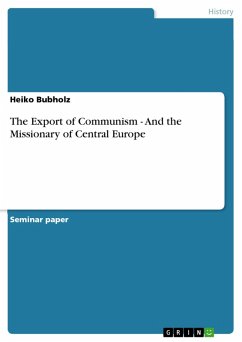Seminar paper from the year 2002 in the subject History - Basics, grade: 1,0 (A), Jagiellonian University in Krakow (Centre for European Studies), course: History of International Relations between Russia and Central Europe, language: English, abstract: I remember November 9, 1989, listing the East German news. The preceding weeks and months left a smell or at least some doubts that something is going not the "socialist" way, which it is supposed to do. It began in the summer of this year in Hungary, was followed by the occupation of several embassies of the Federal Republic of Germany throughout the so-called East block. It was finally caricatured by the ceremonies to the 40th anniversary of the proclamation of the German Democratic Republic, while the presence of Gorbatschow was perceived as the visit of a future liberator rather than the ruling head of the suppressing and dominating "Great Brother". As a child, raised and taught in the socialist way, I had the opportunity to witness this truly historical event. The Iron Curtain, symbolised in East Germany through the existence of a white painted wall, fell at 6:57 p.m. 1. Rather accidentally, it was broadcast in a news conference all over East Germany. Today, November 9, 2001, twelve years later, I am sitting in Kraków enjoying the opportunities the "new" and formerly alien system has bought with it. Hence, it seems time for me to reconsider - though limited - the experiences I could make. Therefor I would like to elaborate what the "socialist" or better Marxist-Leninist system was, how this ideology developed during several periods in history, and whether or how it moved after the World War II from the Soviet Union to the occupied or conquered regions of Central and Eastern Europe. [...]
Dieser Download kann aus rechtlichen Gründen nur mit Rechnungsadresse in A, B, BG, CY, CZ, D, DK, EW, E, FIN, F, GR, HR, H, IRL, I, LT, L, LR, M, NL, PL, P, R, S, SLO, SK ausgeliefert werden.









